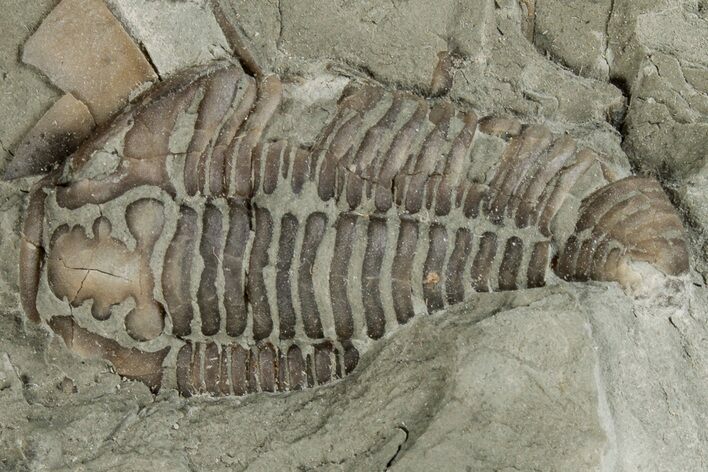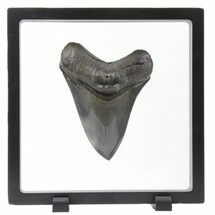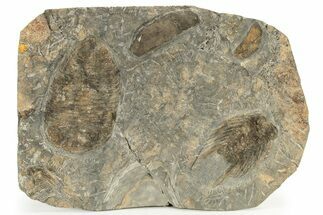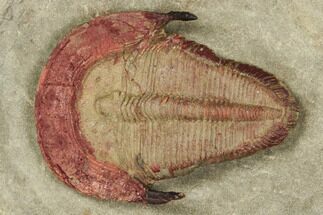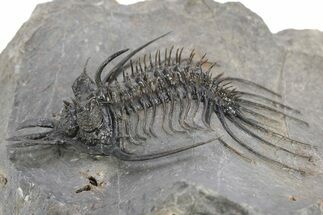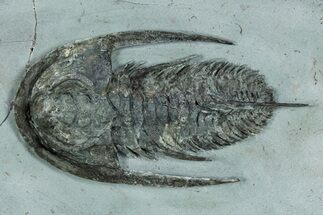This Specimen has been sold.
1.3" Unprepared Flexicalymene Trilobite - Mt. Orab, Ohio
This is a 1.3" long Flexicalymene retrorsa trilobite fossil from the famous trilobite beds at Mt. Orab, Ohio. This specimen is unprepared and has not been cleaned.
About Flexicalymene Trilobites
Flexicalymene is a genus of trilobites of the order Phacopida, suborder Calymenina. These ancient arthropods are an index fossil of the Ordovician, between 488-443 million years ago. The graceful articulation, especially of the thorax segments, demonstrates that this distant precursor of insects is deserving of its delightful name.
Flexicalymene is often found enrolled, seemingly to protect its softer underside from threats on a sea floor teeming with ancient life and increasingly complex predators. Sealing itself inside the hard carapace may be a protective maneuver, or it may simply be the pose of death.
Two species of Flexicalymene are found in the Richmond Formation of Ohio, but in different sub-units. Flexicalymene meeki has small genal spines and is the more common of the two, often coming from Mt Orab, Ohio. These spines are absent in the other species, F. retrorsa. The F. retrorsa cephalon is more rounded, while the F. meeki cephalon is pronounced. They were also denizens at different locales. Calymene, meaning “beautiful crescent”, should not be confused with Flexicalymene: it is a separate genus.
Flexicalymene meeki has been studied for its abundant perforations. The perforations have been interpreted as the loci of sensory hairs: these loci occur in many sizes, and are an interesting feature of exoskeleton microfeatures. They are concentrated on areas most likely to contact other objects in the environment.
Flexicalymene is a genus of trilobites of the order Phacopida, suborder Calymenina. These ancient arthropods are an index fossil of the Ordovician, between 488-443 million years ago. The graceful articulation, especially of the thorax segments, demonstrates that this distant precursor of insects is deserving of its delightful name.
Flexicalymene is often found enrolled, seemingly to protect its softer underside from threats on a sea floor teeming with ancient life and increasingly complex predators. Sealing itself inside the hard carapace may be a protective maneuver, or it may simply be the pose of death.
Two species of Flexicalymene are found in the Richmond Formation of Ohio, but in different sub-units. Flexicalymene meeki has small genal spines and is the more common of the two, often coming from Mt Orab, Ohio. These spines are absent in the other species, F. retrorsa. The F. retrorsa cephalon is more rounded, while the F. meeki cephalon is pronounced. They were also denizens at different locales. Calymene, meaning “beautiful crescent”, should not be confused with Flexicalymene: it is a separate genus.
Flexicalymene meeki has been studied for its abundant perforations. The perforations have been interpreted as the loci of sensory hairs: these loci occur in many sizes, and are an interesting feature of exoskeleton microfeatures. They are concentrated on areas most likely to contact other objects in the environment.
SPECIES
Flexicalymene retrorsa
AGE
LOCATION
Mt. Orab, Ohio
FORMATION
Arnheim Formation
SIZE
1.3" long
CATEGORY
SUB CATEGORY
ITEM
#198006
We guarantee the authenticity of all of our specimens.
 Reviews
Reviews




